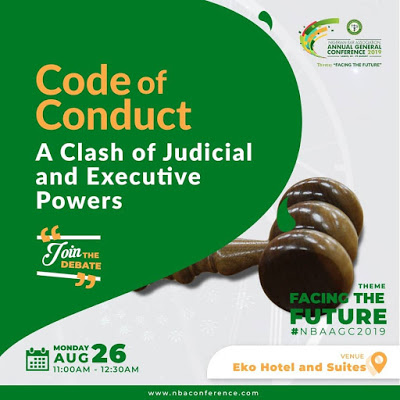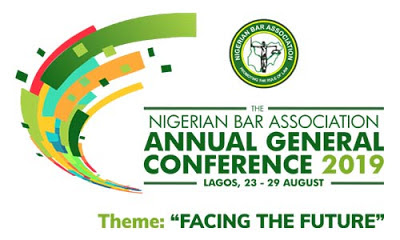
Part 1, of the fifth schedule in the Nigerian Constitution
provides for the code of conduct of public officers. In essence, the CCB was
established for the purpose of addressing issues relating to the conduct of
public officers during their tenure of holding office, also especially to fight
corruption in the public service.
provides for the code of conduct of public officers. In essence, the CCB was
established for the purpose of addressing issues relating to the conduct of
public officers during their tenure of holding office, also especially to fight
corruption in the public service.
The Code of Conduct Bureau and Tribunal Act, Chapter 58 LFN 1990,
gave the Bureau the mandate to establish and maintain a high standard of public
morality in the conduct of government business and to ensure that the actions
and behaviour of public officers conform to the highest standards of public
morality and accountability.
gave the Bureau the mandate to establish and maintain a high standard of public
morality in the conduct of government business and to ensure that the actions
and behaviour of public officers conform to the highest standards of public
morality and accountability.
In recent months, the CCT came under public scrutiny over the
trial of the past Chief Justice of Nigeria, Hon. Justice Walter Onnoghen JSC
(Rtd). Following the trial, a petition was written against the Code of Conduct
Chairman, Mr. Danladi Umar and same was submitted by a group
under the platform of Centre for Justice and Peace Initiative to the
Federal Judicial Service Commission (FJSC) for allegedly abusing his judicial
powers.
trial of the past Chief Justice of Nigeria, Hon. Justice Walter Onnoghen JSC
(Rtd). Following the trial, a petition was written against the Code of Conduct
Chairman, Mr. Danladi Umar and same was submitted by a group
under the platform of Centre for Justice and Peace Initiative to the
Federal Judicial Service Commission (FJSC) for allegedly abusing his judicial
powers.
The CCT
Chairman, however snubbed a query the Federal Judicial Service Commission
(FJSC), issued to get his reaction to the petition accusing him of engaging in
reckless abuse of judicial powers on the ground that that he is not a judicial
officer and further that unlike judicial officers, members of the CCT, at
the time of their inauguration, take official oaths and not judicial oaths.
Chairman, however snubbed a query the Federal Judicial Service Commission
(FJSC), issued to get his reaction to the petition accusing him of engaging in
reckless abuse of judicial powers on the ground that that he is not a judicial
officer and further that unlike judicial officers, members of the CCT, at
the time of their inauguration, take official oaths and not judicial oaths.

According to him, “With regard to the prayer of
the petitioner for an appropriate sanction against the chairman, it is
important to note that the chairman and members of the tribunal, not being
judicial officers, are not constitutionally subject to any disciplinary
proceedings by either the National Judicial Council or the Federal Judicial
Service Commission but the Presidency. “The petitioner alleged that judicial
oaths were breached and that the National Judicial Council should consider
appropriate sanctions. It is to be noted that the chairman and members of the
Code of Conduct Tribunal are not judicial officers.
The CCT Chairman also provided a letter
marked NJC/CIR/HOC/1/74, which had specifically barred members of the CCT from
referring to themselves as Justices. The then CJN, noted that going by
provisions of Paragraph 15 (1 and 2) of Part 1 of the Fifth Schedule of the
1999 Constitution of the Federal Republic of Nigeria, members of the CCT panel
could not be regarded as judges. “From the foregoing provisions, no member,
including the chairman of the CCT on appointment, is a judicial officer as
defined in Section 318 (1) of the 1999 Constitution as amended unless he or she
has held office as a judge of the superior court of record in Nigeria”, the
letter added.
marked NJC/CIR/HOC/1/74, which had specifically barred members of the CCT from
referring to themselves as Justices. The then CJN, noted that going by
provisions of Paragraph 15 (1 and 2) of Part 1 of the Fifth Schedule of the
1999 Constitution of the Federal Republic of Nigeria, members of the CCT panel
could not be regarded as judges. “From the foregoing provisions, no member,
including the chairman of the CCT on appointment, is a judicial officer as
defined in Section 318 (1) of the 1999 Constitution as amended unless he or she
has held office as a judge of the superior court of record in Nigeria”, the
letter added.
Another issue that came to the fore
was the power of the CCT Chairman to order the suspension of the Chief Justice
of Nigeria following an exparte application filed before the CCT. These issues
have caused heated national debates with the Courts of Law also being sort to
give a definite position on the impasses.
was the power of the CCT Chairman to order the suspension of the Chief Justice
of Nigeria following an exparte application filed before the CCT. These issues
have caused heated national debates with the Courts of Law also being sort to
give a definite position on the impasses.
These issues would be one of the
issues discussed at the upcoming NBA Annual General Conference and panelists
who will speak to the issue are the Learned Silks, Mr. Mike Ozekhome, SAN and
Mr. Rotimi Jacobs, SAN. The Learned Silks will certainly have a lot to say
about the legal position regarding the CCT and all lawyers who are interested in
the Rule of Law and due process in Nigeria should make sure to attend.
issues discussed at the upcoming NBA Annual General Conference and panelists
who will speak to the issue are the Learned Silks, Mr. Mike Ozekhome, SAN and
Mr. Rotimi Jacobs, SAN. The Learned Silks will certainly have a lot to say
about the legal position regarding the CCT and all lawyers who are interested in
the Rule of Law and due process in Nigeria should make sure to attend.
@Legalnaija
www.legalnaija.com
